Melora Creager: Sweet Sister Temperance
For nearly two decades, Rasputina has been rocking out with some of the most unlikely instruments (cellos and the occasional banjo or harpsichord) and in some of the most fanciful and restrictive attire (tightly laced corsets and hoopskirts). They have paved the way for experimental cellists to break away from the traditional classical strictures and move toward a much wider audience. Melora Creager, the mastermind and directress behind the formerly ladies-only Traveling Cello Society, has long held a passion for Victoriana and is an avid huntress through the more peculiar annals of history.
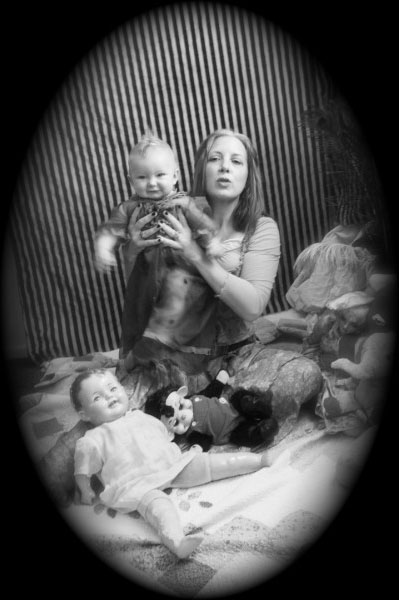
Her wonderful lyrics are often about marvelously obscure subjects such as Snail-Fever, meltable aliens, and the egg-races performed by Easter Islanders. Rasputina’s seventh full-length album, Sister Kinderhook, is stuffed with melancholy gems about the perils of ocean-faring and little girls raised in birdcages. The tone and sound of the record harkens back to early days of Thanks for the Ether, the band’s first groundbreaking album. I had the opportunity to catch up with Melora and company over migas and coffee in Austin. Rasputina’s traveling retinue included not only some delightful new band members (Daniel DeJesus and Melissa Bell), as well as Dawn Miceli, whose documentary about touring with the band, called “Under the Corset” came out this summer. The star of the show, however, was no doubt Melora’s adorable new baby, Ivy – who appears to be a human incarnation of a Kewpie doll. Doll artist and photographer Christy Kane made some lovely portraits of mother and daughter, which we are very pleased to include with this interview.
CH: Over the past 18 years, Rasputina has evolved musically, but has also remained totally true to a beautifully anachronistic aesthetic, and to an experimental sound that has engendered a very devoted fan-base. As directress and songwriter, you never seem to waver from what inspires you. Has it been a battle to lead such an uncompromisingly iconoclastic band through the wilds of an industry which is so increasingly concerned with accessibility?
MC: I’ve always had faith – that to be true to my ideas & taste would help me win in the end. Even if it’s a victory in honor only. But win & victory are battle terms, it’s true. A band is like sports. I’ve been at this so long, that I’ve seen many trends come and go. Sometimes Rasputina is lumped in with them, but these trends always pass away. I keep faith that my best efforts are beyond fashion. Rasputina started on a major label, has grown steadily smaller, and has gotten more and more fun as it shrinks. I was raised in the industry to try to make hits, to try to get on the radio. It took a few years to get that out of the back of my mind. Maybe 5 years ago, I started to be free of it. It’s funny though, because think of all the weird songs I’ve made- you’d never know I was attempting hits!
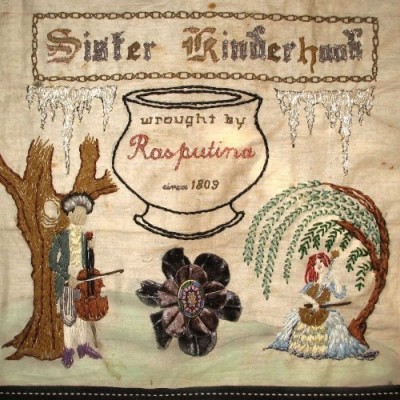
CH: Much of Rasputina’s inspiration appears to come from the hardworking and meticulous ladies of yore, who stitched and slaved away to create lasting things of beauty. You make and design the majority of your album covers and merchandise by hand, including the embroidery on the cover for your newest album, Sister Kinderhook. With the collapse of the traditional music industry as we know it, have you noticed more musicians getting motivated to be more DIY with their careers? What are your thoughts on the craft renaissance and the renewed appreciation for fancy handwork?
MC: With other musicians I talk to, of different levels of success, I don’t hear about labels anymore. Do they exist beyond Beyoncé? I really stay out of the whole music industry. I make my things as hand-made as possible. I use a cd manufacturer that’s here in my little town. I was looking through the craft magazine section at a book-store, and was shocked at how much material there was and how common advanced techniques are. That is a great thing that lots of people want to spend their time that way. I have heard that young people shun Facebook and prefer quilting & etc. Good.
CH: You just completed a tour around the country with a little baby in tow, and you have an eleven year old daughter back at home. How have you managed to juggle motherhood with the demands of being a touring musician? Have your daughters affected or inspired your music?
MC: I’m trying to answer this question right now, but I can’t concentrate while Baby Ivy is gurgling! [2 hours later…] Ok, she’s asleep. I just fell into the touring as a way of making a living, so you gotta do what you’ve gotta do. Hollis has always stayed with her father while I toured. I may be gone for weeks at a time, but I am really present when I’m home, which is the majority of the time. Ivy’s father is involved in my tour work, so I bring her, and we’re all together. I figured that other than the actual show, I’m just sitting around all day. Why couldn’t I take care of Ivy on the road? It went pretty well. It’s nice for her to have the band around her, loving her too. I need to be alone for other creative activities as well, like song-writing. I need uninterrupted time to set my mind free. That is hard to come by with children, so I don’t get time just how I want it, but I make do and somehow get the work done. Having Hollis helped my whole psychology. Having a child made me put career competition into perspective- I found I just had to make things (music/art/craft), regardless of the music business or an audience. Being a mother has given me confidence as a person, which improves my voice. I think singing is 80% psychology or confidence or lack-thereof. Keeping the child in me alive and thriving is important to my imagination and happiness. I don’t think my children produce that in me- having children often takes it out of people, from all the responsibility and worry. I think the child-likeness is natural to me. But that quality might be why I like children so much.
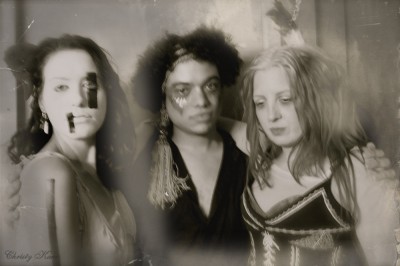
CH: For many years, Rasputina has existed as a ladies-only cello society, (with the exception of some very masculine drummers!) but with the addition of 2nd chair Daniel DeJesus, the band is now a co-ed institution. Daniel brings a lot of passion to the new album with his beautiful singing and dolorous erhu, and it’s obvious that he’s really passionate about the music. How did you find each other?
MC: Daniel heard I needed a cellist, so he emailed me, never thinking he’d get in since he’s a guy. I took one look & listen at him and I was sold! We play so well together, he’s so talented, he’s so into the ideas of the band and he is a very nice person. It was an easy decision. He auditioned by coming over to a big party that I had. He took the train here, and we sat down and played in front of the party guests. That was so brave of him. No one ever talks about how he’s the first Puerto Rican or hispanic or black member. He’s got it all going on.
CH: Many of your songs are about surviving through disasters, living through hard times, and the intense effects of climate change. Do you ever wonder if an apocalypse is imminent, or imagine how you’d be living if the end-times came around? You have described yourself as a “Practicing Depressionist”, so hopefully you’ll be better prepared than most when and if the shit hits the fan!
MC: I was feeling very “end times” a few years ago, and that’s partly why I moved out of the city. I was in New York City during September 11, then after Hurricane Katrina, I just did not want to be in a city for any kind of disaster that might be coming. Then a couple of years later, gas prices went very high and ruined my touring plans. I became interested in Peak Oil at that time. But I’m much more relaxed about those things now. What can you do? This is the world we live in. I am pretty removed from the commercial world. We don’t watch TV, it’s not hard to eat locally around here… I have started wishing that I truly did live in the past though – before advertising.
CH: It’s clear from reading your lyrics that you are a voracious reader, and that you have a deep love for word-play. Do you have plans at any point to share your writing in book-form? Will you tell us about a few of your favorite authors and bookshelf all-stars?
MC: I make numerous plans for books, but am unable to get very far because I need to be doing other things. It will come, it’s just such a big task. I’d like to make an illustrated memoir – needlepoint me meeting Kurt Cobain, things like that. Things go in such cycles for me. I just finished a long, intense tour and got well-oiled at performing. Now it’s time to readjust to home and start something new. Nathaniel Hawthorne, Thomas Hardy, Upton Sinclair, Kafka & Trollope. I’ll read anything about Emily Dickinson.
CH: Many of your song subjects are inspired by historical events, apocryphal and otherwise. You use your lyrics to engage in political metaphor, and draw many parallels between the rampant injustices of days both past and present. Do your explorations in history influence your opinions on our present state of affairs? What lessons can we learn from our forebears?
MC: A big part of why I’m so interested in history is that people have been making the same mistakes, having the same emotional reactions for many, many hundreds of years. In biography, I can see so many examples of how to behave or not to. I search for humanity in the driest accounts. I get interested in horrible events, because I can’t believe people are capable of such horrible acts. I want to understand how they become so. I couldn’t believe what was happening under Bush. Americans were torturers? My past reading on Fascism helped me to understand, or to take it seriously.
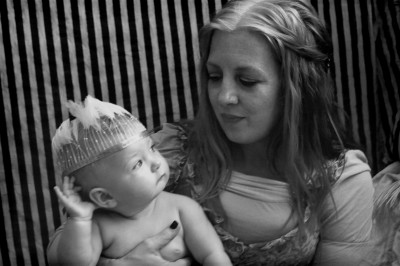
CH: Your songs have given voice to so many marginalized female characters from history, factual or invented. Many of the women and girls who had been shoved into the traditional roles of workhorse, drudge, doting mother or obedient orphan get to say their piece through your lyrics. The ladies in your songs are constantly escaping diabolical finishing schools, tragic factory fires, or lives in various forms of captivity or servitude. You’re the one who allows them to finally be free, who makes their stories known. Can you tell us about some of these women, and what they mean to you?
MC: I just read that Jane Eyre was Charlotte Bronte’s way of speaking her mind, of answering every injustice about which she had kept her mouth closed. I love that and relate to it. Songs or song characters are places for me to work out my issues. I don’t write about my private life openly, but I’m human and an artist, so it will always be my lens it’s through. I want to recognize and examine feelings of loneliness, victimhood, unattractiveness. I also make what I want to entertain myself. I love the Girls’ School scenes. I love the Gingerbread Coffin girls. Hey, maybe they’re the same girls! Those songs are like an Afterschool Special.
CH: Rasputina albums and live shows always manage to strike a perfect balance between sad songs and comic interludes. You add a lot of levity with your stage banter and in the odd and funny fragments on tracks where you utilize different accents and clever impersonations. The combination of gallows humor with your deadpan delivery is just fantastic. How did you first begin to discover your comedic voice?
MC: When I started performing as?/with?/in? Rasputina, I was very shy, and the moments between songs – when everyone would tune and fiddle around with their instrument – felt like an eternity to me. So I filled it with what were, to me, fairly obvious introductions to the songs. Somehow, I began writing those out- having a big plan about them. I developed a personal shorthand for my set-lists that only I could read. I couldn’t read them in the show either, they were just lucky charms to remember what I wanted to say. Funny, speaking or odd recordings have always been really easy to make. It’s just fooling around, but in my organized way. I’ll usually write a script. It’s a blast to try to talk like the character I’m envisioning.
CH: I understand that you have taught some young people to play cello, and that also you studied a form of music therapy where you play cello live for terminally ill or dying people. Can you tell me a bit about your experiences teaching and sharing your craft in these ways?
MC: The music therapy studies were truly amazing. It is a highly specific way of playing one on one with sick or dying people. The process and act of dying (that all people go through), is a humbling and beautiful thing. When you do this playing, you connect with the person you’re playing for. I’ve played for a friend’s mother who had cancer, a baby with Down syndrome, a man with Alzheimer’s. I learned so much from each of them or each session. I’m not so much the music teacher. I don’t have patience for little kids who don’t know how to read music. I’d rather give other gifts with my musicianship.
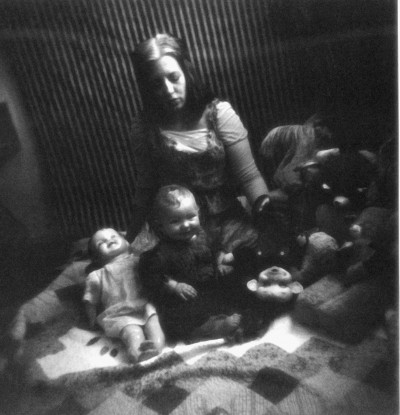

October 1st, 2010 at 7:30 am
Thanks so much for posting this! Great interview with a True Great. :)
October 1st, 2010 at 7:37 am
I’ve been waiting the entire life-up-to-this-point of CoilHouse to see the wonderful Rasputina here (Unless they have already and I missed it). Thanks for the Ether and How We Quit the Forest were huge albums for me. The cusp of breaking my 20th. Melora and crew speak my language, as artists, in ways that crawl out of my head, not in. All the kids love cello rock. Hey ho, let’s go.
p.s. Nice hearing a fellow parent/artist discuss the complexities of rearing children whilst still maintaining one’s creative voice/output. It betters your work, to be sure, but it snips away a good chunk of your time spent working. There’s an argument for quality over quantity, there.
October 1st, 2010 at 10:21 am
This is wonderful, thank you!
October 1st, 2010 at 11:51 am
This was a really interesting, well written, intelligent interview. I enjoyed it so much. Beyond the fact that I am a huge Rasputina fan for many years now, I am truly impressed.
Everyone should go out and give Sister Kinderhook a listen. It’s really amazing.
And these portraits are adorable!!
October 1st, 2010 at 4:50 pm
I loved reading this. Rasputina was one of the first “weird” bands I discovered as a young teenager and they have always held a special place in my heart. : )
October 1st, 2010 at 7:25 pm
[…] out the interview on Coilhouse This entry was posted in NYC & The Boroughs, Noetic and tagged Rasputina. Bookmark the […]
October 2nd, 2010 at 6:10 am
Great, great interview!
October 2nd, 2010 at 10:59 pm
This is a marvelous interview! I am trying to get a comics anthology based on Rasputina moving (Melora and her management have given the initial OK, just wrangling contracts now!), and this will be required reading for any contributors. Melora’s perspective of history and of the characters she creates will be particularly helpful. I love the stories Melora tells in concert to introduce songs. I want to make use of those in the anthology, too.
October 4th, 2010 at 9:22 pm
So wonderful, thank you for this! More creative cellist interviews Please! Zoe, Melora…you should interview Julia Kent next!
October 6th, 2010 at 8:28 pm
The only thing that could have made this interview even better- would be to actually hear your voices speaking, with Rasputina playing in the background!
October 10th, 2010 at 6:48 am
Angeliska asked all the questions I would have loved to ask Melora – Rasputina has been my favorite band since I first heard them just over a decade ago. I was so sad to miss the most recent show here in Asheville, but I’ve seen them over a dozen times in all the various incarnations. Thanks for this interview, Coilhouse, and Christy for the beautiful photos!
August 11th, 2011 at 6:57 am
This is a really great article about a very innovative artist. It’s almost funny that it’s taken us so long to get Melora in Coilhouse ! And it’s damn well time. Thanks for another informative and insightful interview…………….